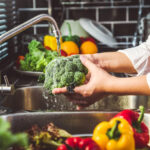Exposing the dark side of Edipeel, the controversial Bill Gates-funded edible coating for produce
 (NaturalHealth365) In a supposed effort to curb food waste, an American company called Apeel Sciences – in partnership with the Bill & Melinda Gates Foundation – has created a new fruit and vegetable coating that is intended to extend fresh produce’s shelf life.
(NaturalHealth365) In a supposed effort to curb food waste, an American company called Apeel Sciences – in partnership with the Bill & Melinda Gates Foundation – has created a new fruit and vegetable coating that is intended to extend fresh produce’s shelf life.
The product, known as Edipeel, is supposedly perfectly safe to eat and derived from food-grade, plant-based glycerolipids, and oils. But questions remain over the real safety of the latest iteration of Corporate America’s obsession with tinkering with our food.
Bill Gates is funding a new “edible coating” to be put on conventional AND organic produce – here’s what we know
The edible food coating is reportedly colorless, odorless, tasteless, and (allegedly) perfectly safe to eat. However, as Children’s Health Defense notes in a recent article, it can’t be removed from fruits or veggies, even after soaking or scrubbing. (It’s also not clear whether any part of the coating gets absorbed into the produce itself.)
Apeel Sciences recently applied for a generally recognized as safe (GRAS) recognition for its new product, particularly as it relates to the primary ingredients: 2,3-dihydroxypropyl palmitate (PA-1G) and 1,3 dihydroxypropan-2-yl palmitate (PA-2G). As described in the GRAS application, people who eat a lot of fruits and veggies may end up consuming up to 218 mg or more of this coating per day.
Importantly, the GRAS application and justification rely on existing scientific research and prior regulations – which, as Children’s Health Defense points out, means there is no new science being required nor utilized to evaluate Edipeel’s safety and effectiveness.
As with most additives, chemical compounds, and other things added to our water, food, and environment in droves, the dose likely makes the poison. And in small quantities, this food coating may indeed be perfectly safe for human consumption. But what about the cumulative effect of eating lots of produce treated with this new product over months and years? How can we be so confident that it is safe to eat and that there are no health risks we should be on the lookout for?
And more importantly, if Edipeel ends up on the majority of conventional AND organic produce, how are consumers going to be able to opt out of this product if they want to?
How to wash your fresh produce the right way?
There’s no question that washing your fresh fruits and vegetables before eating them is a good idea. Washing produce helps to remove excess dirt, pesticides (including pesticides approved for use on organic produce), bacteria, and other debris that can easily find its way onto your food. Here are some tips on how to do it safely and effectively, according to Consumer Reports and the Food Network:
- Do NOT wash your fruits or veggies until you are ready to eat them or cook them. If you wash them and then let them sit in the fridge, even more bacteria can grow on them.
- Wash your fruit and veggies in cold running water for at least 15 to 20 seconds before you do any cutting, chopping, or prepping (this is to avoid transferring pesticides and residue from the outside of the produce to the flesh on the inside).
- For additional deep cleaning, try a baking soda soak: submerge and soak your produce in a solution of one teaspoon of baking soda and two cups of water for at least two minutes, and ideally up to 15 minutes if you have the time for added pesticide removal. Be sure to rinse the produce again before using it.
- You can also try the vinegar method: mix 1 cup of white or apple cider vinegar with 4 cups of water, then submerge your produce in it completely for up to 3 minutes. Finish by thoroughly rinsing your produce and patting it dry. For larger produce like apples, pears, and nectarines, you can also try putting the vinegar wash solution in a spray bottle and spraying the produce instead. After spraying thoroughly, let the produce sit in a colander for five minutes, then rinse and pat dry.
It’s unfortunate, of course, that the new food coating by Apeel Sciences is reportedly unable to be removed even with washing or scrubbing. Plus, many conventionally-grown fruits and veggies will have pesticides in them in addition to on them, so washing is unlikely to cut down on all pesticide exposure in these cases.
That said, here’s what you can do: opt for locally grown organic produce whenever possible, and if you want to reduce your exposure to Apeel’s edible produce coating, consider asking your organic supplier if they’re going to be using Gates’ new food science project. And, of course, growing your own organic food is your best (healthiest) option.
Sources for this article include:
Consumerreports.org
Foodnetwork.com
FDA.gov
Childrenshealthdefense.org



